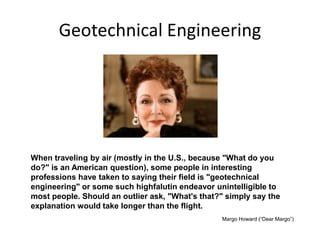Facts About Geotheta Uncovered
Facts About Geotheta Uncovered
Blog Article
Examine This Report on Geotheta
Table of ContentsIndicators on Geotheta You Should KnowGeotheta Fundamentals ExplainedGeotheta Things To Know Before You Get ThisThe 7-Minute Rule for GeothetaHow Geotheta can Save You Time, Stress, and Money.

They carry out website examinations, accumulate samples, carry out research laboratory tests, and examine data to assess the suitability of the ground for construction jobs - Geotechnical Engineers. Based upon their findings, geotechnical engineers provide referrals for structure style, slope security, retaining frameworks, and mitigation of geotechnical risks. They collaborate with various other specialists, such as architects, structural designers, and construction teams, to ensure that geotechnical factors to consider are integrated right into the total project design and application
By examining the habits and buildings of soil and rock, they can determine potential geotechnical hazards such as landslides, dirt settlement, or incline instability. Their knowledge aids avoid failures or mishaps that can endanger lives and residential or commercial property. Right here are some detailed duties and duties of a geotechnical engineer: Site Investigation: Geotechnical designers conduct website investigations to gather information on subsurface problems.
They analyze the data to comprehend the residential properties and habits of the dirt and rock, including their stamina, leaks in the structure, compaction characteristics, and groundwater problems. Geotechnical Analysis and Design: Geotechnical designers analyze the information accumulated throughout website examinations to assess the security and viability of the site for building and construction jobs. They perform geotechnical computations and modeling to review elements such as bearing capability, settlement, incline security, lateral planet pressures, and groundwater circulation.
An Unbiased View of Geotheta
Foundation Layout: Geotechnical engineers play a vital duty in designing foundations that can securely support the designated framework. They evaluate the dirt conditions and load demands to establish the proper structure type, such as superficial structures (e.g., grounds), deep foundations (e.g (https://geotheta.godaddysites.com/f/why-geotechnical-engineers-are-your-projects-best-friends)., heaps), or specialized methods like dirt renovation. They consider variables such as negotiation limits, bearing capability, and soil-structure communication to develop optimal foundation styles
They examine building and construction strategies, display website activities, and perform field assessments to verify that the layout recommendations are complied with. If unanticipated geotechnical problems occur, they evaluate the scenario and give referrals for removal or changes to the style. Danger Analysis and Mitigation: Geotechnical engineers evaluate geotechnical hazards and threats linked with the project website, such as landslides, liquefaction, or soil disintegration.

Cooperation and Communication: Geotechnical designers function closely with other professionals associated with a job, such as architects, architectural engineers, and building and construction groups. Efficient communication and collaboration are vital to integrate geotechnical factors to consider right into the overall task style and construction procedure. Geotechnical designers supply technological competence, response questions, and make certain that geotechnical demands are fulfilled.
Some Ideas on Geotheta You Should Know
Here are some sorts of geotechnical engineers: Structure Engineer: Foundation engineers concentrate on designing and assessing foundations for frameworks. They analyze the soil problems, lots requirements, and site qualities to identify the most suitable foundation kind and style, such as shallow structures, deep structures, or specialized strategies like heap structures.
They review the factors influencing incline security, such as dirt homes, groundwater problems, and slope geometry, and establish methods to stop slope failures and reduce threats. Earthquake Designer: Quake designers concentrate on examining and developing frameworks to withstand seismic pressures. They assess the seismic danger of a site, review soil liquefaction possibility, and create seismic design requirements to make sure the safety and resilience of frameworks during quakes.
They execute field testing, gather examples, and analyze the accumulated data to identify the soil residential properties, geologic developments, and groundwater problems at a website. Geotechnical Instrumentation Designer: Geotechnical instrumentation designers concentrate on tracking and determining the behavior of soil, rock, and frameworks. They install and maintain instrumentation systems that keep track of factors such as soil negotiation, groundwater degrees, incline motions, and architectural displacements to analyze efficiency and offer very early cautions of prospective concerns.
The 9-Minute Rule for Geotheta
They conduct examinations such as triaxial tests, combination tests, direct shear examinations, and leaks in the structure examinations to collect data for geotechnical evaluation and layout. Geosynthetics Engineer: Geosynthetics designers concentrate on the layout and application of geosynthetic materials, such as geotextiles, geogrids, and geomembranes. They utilize these products to improve dirt security, enhance slopes, provide water drainage remedies, and control disintegration.
They often tend to be investigative people, which indicates they're intellectual, introspective, and investigative. They are interested, methodical, logical, analytical, and logical. Some of them are additionally social, indicating they're kind, charitable, participating, patient, caring, helpful, understanding, tactful, and friendly - Consulting Engineer.
In the office atmosphere, geotechnical engineers make use of specialized software application devices to carry out computations, develop designs, and assess data. They prepare reports, testimonial job specifications, communicate with customers and employee, and coordinate project tasks. The office setting provides a favorable environment for research study, analysis, and cooperation with other experts included in the project.
Little Known Facts About Geotheta.
They regularly visit task websites to carry out site examinations, assess geotechnical conditions, and gather data for analysis. These visits entail taking a trip to various locations, sometimes in remote or difficult terrains. Geotechnical engineers may carry out dirt sampling, conduct examinations, and screen building and construction tasks to ensure that the geotechnical aspects of the project are being applied properly.
Geotechnical designers additionally function in specialized geotechnical labs. Geotechnical laboratory designers work extensively in these atmospheres, dealing with testing equipment, running instruments, and recording data.
Report this page